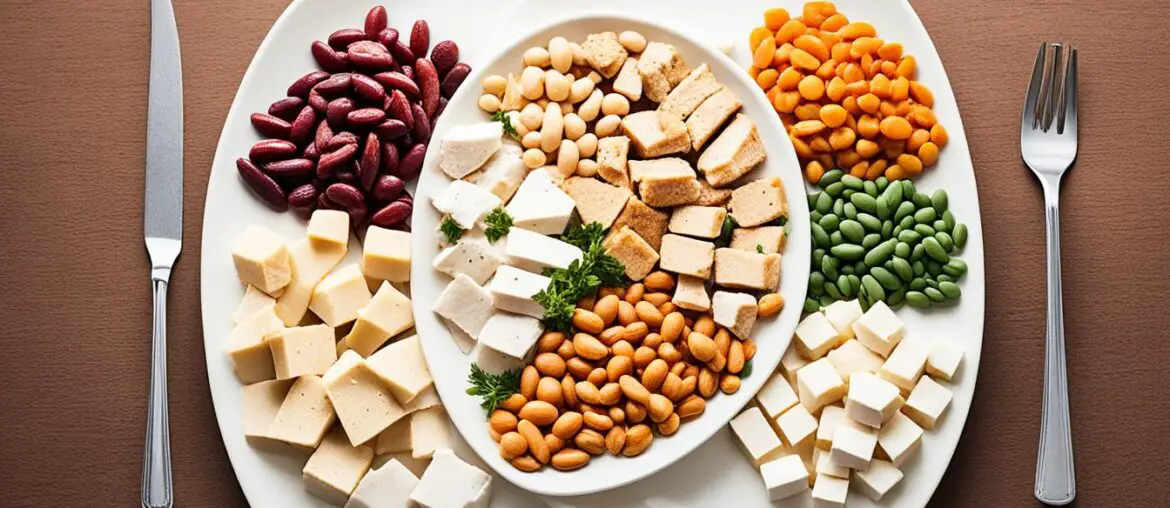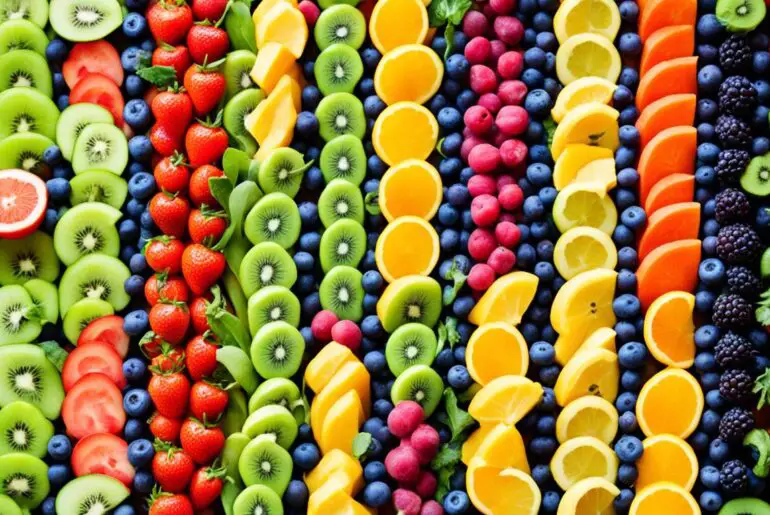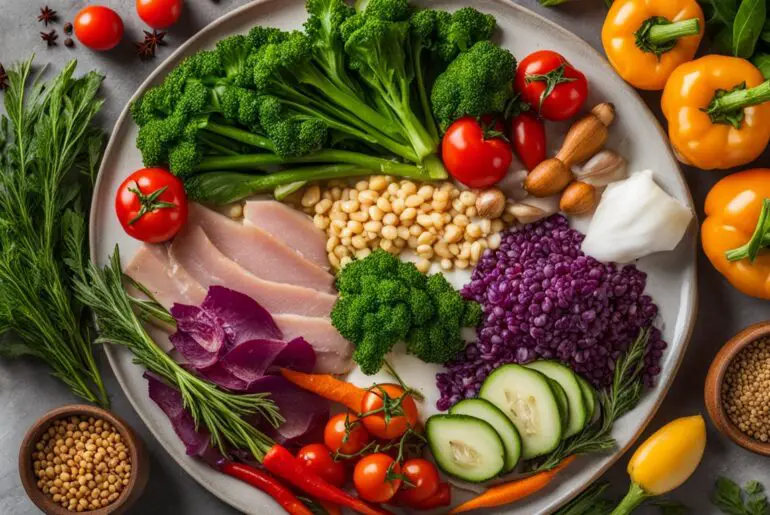Did you know that the HCG diet, a controversial weight loss plan, combines HCG supplements or hormone injections with an extremely low-calorie diet? While the effectiveness and safety of this diet remain a topic of debate among health experts, there are protein sources that can be incorporated into a post-HCG eating plan to support weight loss and provide optimal nutrition.
Protein is known for its ability to promote satiety, increase metabolism, and help maintain muscle mass, making it an essential nutrient for weight management. In this article, I will discuss the benefits of including protein in your post-HCG eating plan and provide ideas for protein-rich meals that support weight loss efforts.
Key Takeaways:
- Following the HCG diet involves HCG supplements or hormone injections along with extreme calorie restriction.
- The HCG diet is highly controversial and not recognized as safe or effective by health experts.
- Incorporating protein in a post-HCG eating plan can support weight loss and muscle maintenance.
- High protein foods, such as eggs, Greek yogurt, and legumes, can be included in post-HCG meals.
- Lean protein sources like chicken breast, white fish, and tofu are excellent options for post-HCG eating.
Understanding the HCG Diet and Its Controversies
The HCG diet is a short-term eating plan that combines HCG supplements or hormone injections with a severely reduced calorie intake. This diet is divided into three phases: loading, weight loss, and maintenance.
During the weight loss phase, individuals following the HCG diet are required to limit their calorie intake to either 500 or 800 calories per day, depending on the specific protocol. This extreme calorie restriction is a defining characteristic of the HCG diet.
However, it is important to note that the HCG diet is highly controversial and not recognized as safe or effective by health experts. The controversy surrounding the HCG diet stems from several factors:
- First, the HCG hormone itself is not proven to directly cause weight loss. Instead, the weight loss achieved on the HCG diet is primarily attributed to the extreme calorie restriction imposed during the diet phases.
- Second, the HCG diet lacks substantial scientific evidence to support its claims of long-term weight loss or overall health benefits.
- Third, health experts raise concerns about potential side effects and risks associated with HCG supplements or hormone injections, especially when combined with extreme calorie restriction.
Expert Quote:
While the HCG diet may result in rapid weight loss, the lack of scientific evidence supporting its efficacy and long-term safety raises significant concerns. Extreme calorie restriction, rather than the HCG hormone itself, is the primary mechanism behind the observed weight loss on this diet.
It is crucial to approach the HCG diet with caution and consider alternative weight loss methods that are supported by scientific research and recognized as safe by healthcare professionals. Proper nutrition, regular physical activity, and a balanced dietary approach are key components of sustainable weight loss and long-term health.
Protein and Weight Loss
When it comes to weight loss, incorporating protein into your post-HCG eating plan can offer significant benefits. Protein is well-known for its ability to promote satiety and boost metabolism, making it a valuable nutrient for those aiming to manage their weight. By including lean protein sources in your meals, such as chicken, fish, turkey, and lean beef, you can support your weight loss efforts while ensuring that your body receives the essential nutrients it needs.
Protein-rich diets have been shown to have a positive impact on weight loss. When consumed, protein takes longer to digest than fats or carbohydrates, which helps to keep you feeling full and satisfied, reducing the likelihood of overeating or snacking on unhealthy options throughout the day. Additionally, protein has a thermogenic effect, meaning that your body burns more calories during the digestion process, further contributing to weight loss.
Lean protein sources are particularly beneficial for weight management. These options are low in fat, helping to keep your caloric intake in check while providing essential amino acids that support muscle growth and maintenance. By prioritizing lean protein sources, you can fuel your body with the necessary nutrients to support your weight loss journey.
Why Choose Lean Protein Sources?
Lean protein sources, such as chicken breast, fish, turkey breast, and extra-lean beef, offer several advantages for weight loss:
- Low in fat: Lean protein sources have minimal fat content, making them ideal for individuals looking to cut calories and reduce their overall fat intake.
- High in protein: These sources provide a generous amount of protein, a macronutrient essential for muscle synthesis, metabolism, and satiety.
- Versatile: Lean protein sources can be prepared in various ways, giving you the flexibility to create nutritious and delicious meals that align with your taste preferences.
- Nutrient-dense: In addition to protein, lean protein sources offer a wide range of essential nutrients, including vitamins, minerals, and antioxidants, which support overall health and well-being.
By incorporating lean protein sources into your post-HCG eating plan, you can optimize your weight loss efforts while ensuring that your body receives the proper nourishment it needs. A balanced combination of protein-rich foods, vegetables, and healthy fats can help you design meals that are both satisfying and supportive of your weight loss goals.
Complete Protein Sources Table
| Protein Source | Protein Content (per 100g) | Fat Content (per 100g) |
|---|---|---|
| Chicken breast | 31g | 3.6g |
| Fish | 22g-26g (depending on the variety) | Varies based on the type of fish |
| Turkey breast | 29g | 1g |
| Extra-lean beef | 23g-25g (depending on the cut) | Varies based on the cut of beef |
Incorporating lean protein sources into your post-HCG eating plan is a powerful strategy for weight loss and overall health. By focusing on protein-rich meals and selecting options low in fat, you can fuel your body with essential nutrients while supporting your weight management goals.
High Protein Foods for Post-HCG Eating
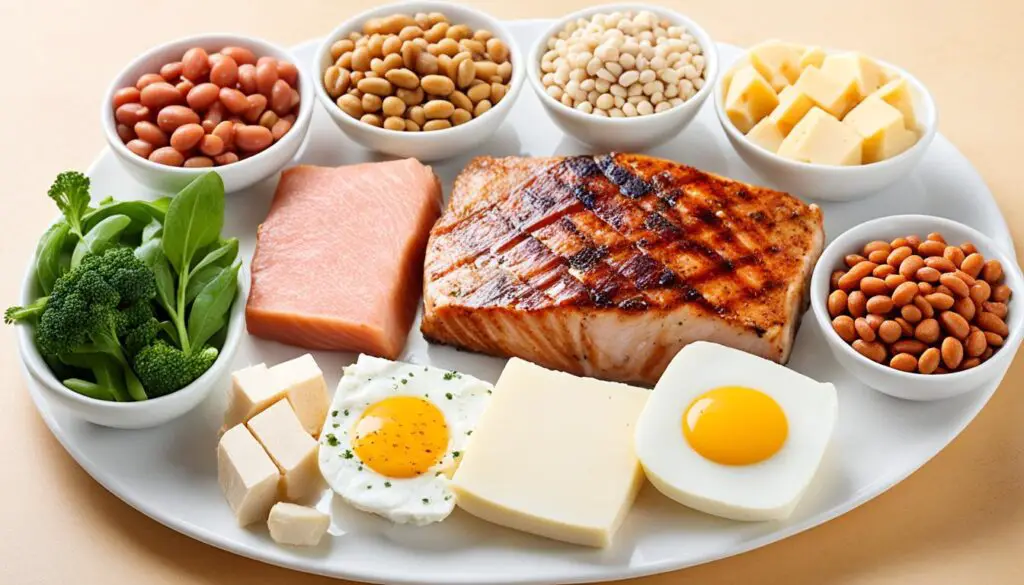
After completing the HCG diet, it’s crucial to prioritize high protein foods to support weight maintenance and prevent muscle loss. Incorporating protein-rich options into your post-HCG eating plan will not only provide essential nutrients but also help you feel satisfied and full for longer periods. By combining these high protein foods with vegetables and healthy fats, you can create delicious and nutritious meals that support your weight loss goals.
Examples of High Protein Foods
When it comes to high protein foods, there are plenty of options to choose from:
- Eggs: A versatile and nutrient-dense protein source, eggs are packed with essential amino acids and can be enjoyed in various ways.
- Greek Yogurt: Known for its creamy texture and tangy flavor, Greek yogurt is an excellent source of protein and also provides valuable probiotics for gut health.
- Cottage Cheese: With its mild flavor and smooth texture, cottage cheese is a low-fat protein option that can be enjoyed on its own or incorporated into sweet or savory dishes.
- Tofu: A popular plant-based protein source, tofu is rich in protein and can be used as a substitute for meat in various recipes.
- Legumes: Beans, lentils, and chickpeas are all legumes that are high in protein, fiber, and other essential nutrients. These versatile ingredients can be added to soups, salads, or main dishes to boost protein content.
Remember to opt for low-fat protein options to keep your overall fat intake in check, as it’s important to strike a balance between protein, carbohydrates, and fats in your diet. By incorporating these high protein foods into your post-HCG eating plan, you can maintain a protein-rich diet that supports weight maintenance and overall health.
Choose high protein foods to support weight maintenance and prevent muscle loss after completing the HCG diet.
Incorporating Lean Protein Sources
In a post-HCG eating plan, incorporating lean protein sources is key to supporting weight loss and providing satiety. Lean protein options are low in fat and calories while still providing essential amino acids, making them an excellent choice for those looking to shed pounds. Here are some examples of lean protein sources that can be included in meals:
- Chicken breast: A versatile and popular lean protein option that is low in fat and high in protein.
- White fish: Another low-fat protein choice that is rich in nutrients and low in calories. Examples include cod, haddock, and tilapia.
- Turkey breast: Lean cuts of turkey breast are a great source of protein and can be enjoyed in various dishes.
- Extra-lean beef: Opting for lean cuts of beef, such as sirloin or tenderloin, can provide the necessary protein while keeping the fat content low.
By incorporating these lean protein sources into your post-HCG meals, you’ll be able to support your weight loss goals while enjoying delicious and satisfying meals.
| Lean Protein Source | Protein Content (per 100g) | Calories (per 100g) | Fat Content (per 100g) |
|---|---|---|---|
| Chicken Breast | 31g | 165 | 3.6g |
| White Fish (Cod) | 20g | 82 | 0.7g |
| Turkey Breast | 29g | 135 | 1g |
| Extra-Lean Beef (Sirloin) | 25g | 158 | 4g |
By including lean protein sources like chicken breast, white fish, turkey breast, and extra-lean beef in your post-HCG eating plan, you can satisfy your protein needs while maintaining a low-fat and calorie-conscious approach.
Plant-Based Protein Sources
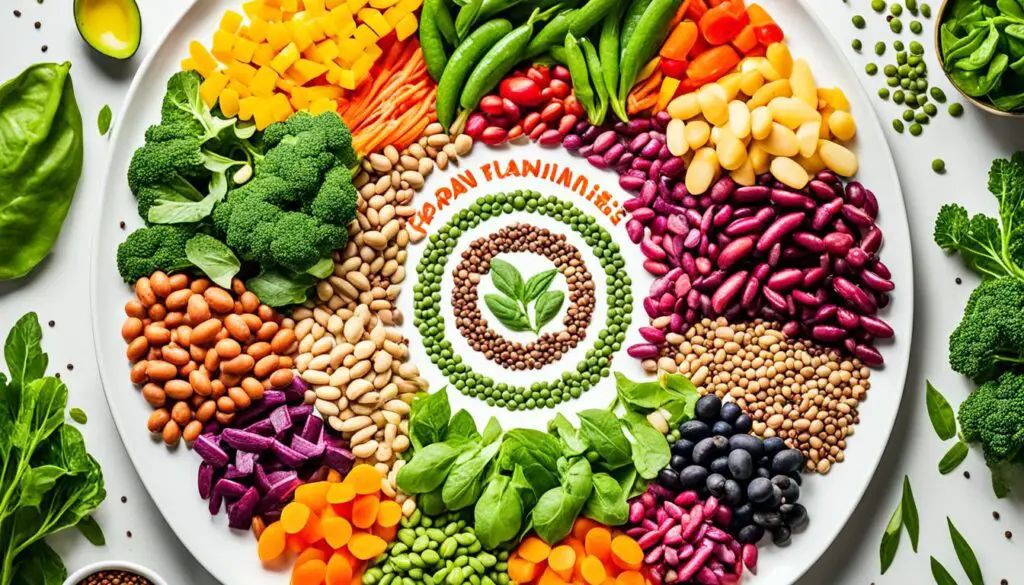
For individuals following a vegetarian or plant-based diet after completing the HCG diet, there are plenty of protein-rich options available. Incorporating plant-based protein sources into meals can provide the necessary protein while supporting weight loss goals.
Lentils are an excellent plant-based protein source, providing approximately 18 grams of protein per cooked cup. They are also high in fiber, which can promote feelings of fullness and aid in weight loss.
Quinoa is another versatile plant-based protein option. With approximately 8 grams of protein per cooked cup, quinoa is not only rich in protein but also a complete protein source. It contains all the essential amino acids your body needs for optimal health.
Chickpeas, also known as garbanzo beans, are a popular choice for vegetarian protein. They offer approximately 15 grams of protein per cooked cup and are high in fiber, minerals, and vitamins. Chickpeas can be used in various dishes, including salads, soups, and even homemade hummus.
Tofu is a versatile plant-based protein source made from soybeans. It provides about 20 grams of protein per half-cup serving and is low in calories and saturated fat. Tofu can be included in stir-fries, grilled dishes, and even desserts.
| Plant-Based Protein Sources | Protein Content (per serving) |
|---|---|
| Lentils | 18 grams (cooked cup) |
| Quinoa | 8 grams (cooked cup) |
| Chickpeas | 15 grams (cooked cup) |
| Tofu | 20 grams (half-cup serving) |
Incorporating these plant-based protein sources into your post-HCG eating plan can provide the necessary protein for weight loss while also offering a range of essential nutrients. These vegetarian protein options are not only beneficial for your health but also contribute to a more sustainable and environmentally friendly diet.
Protein and Muscle Maintenance
https://www.youtube.com/watch?v=WRtJXdAvpwA
Including protein in post-HCG meals is crucial for muscle maintenance. During weight loss, there is a risk of losing muscle mass. However, consuming adequate protein can help preserve muscle and support a healthy body composition. Protein-rich foods should be incorporated into the post-HCG eating plan to ensure proper muscle maintenance.
When it comes to protein for weight loss, it’s not just about shedding pounds but also maintaining lean muscle mass. Muscle plays a vital role in metabolism, as it burns more calories than fat. Therefore, to optimize weight loss and prevent muscle loss, it is important to prioritize protein intake.
Protein is made up of amino acids, which are the building blocks of muscle tissue. Including post-diet protein intake in your meal plan can help repair and rebuild any muscle that may have been lost during the weight loss journey. It also supports the creation of new muscle tissue, which can help maintain a toned and healthy physique.
Protein is essential for muscle maintenance, repair, and growth. By including protein-rich foods in your post-HCG eating plan, you can ensure that your body has the necessary building blocks to support muscle health.
When selecting protein sources for muscle maintenance, it is important to choose lean options. These include skinless chicken breast, turkey breast, fish, tofu, and legumes. These options are not only protein for weight loss but also low in fat, making them suitable for maintaining a healthy body composition.
It is also important to distribute protein intake evenly throughout the day. This allows for a steady supply of amino acids to support muscle repair and growth. Aim to include a source of protein in each meal and snack to maximize the benefits.
Benefits of protein for muscle maintenance:
- Promotes muscle repair and growth
- Preserves muscle mass during weight loss
- Increases satiety and reduces hunger
- Supports a healthy body composition
- Boosts metabolism and calorie burning
By prioritizing protein intake and incorporating it into your post-HCG eating plan, you can ensure that your body has the necessary nutrients to maintain and build muscle. This not only supports your weight loss journey but also promotes overall health and well-being.
Balancing Protein with Vegetables and Healthy Fats
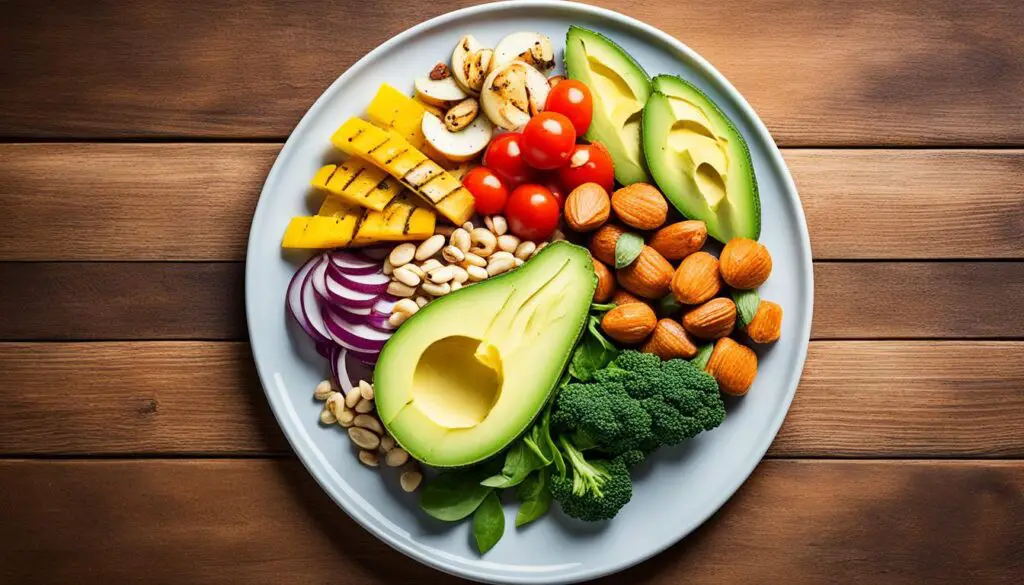
While protein is crucial for weight loss and muscle maintenance, it’s equally important to create balanced meals by incorporating protein and vegetables along with healthy fats. This combination not only ensures a well-rounded meal but also provides a variety of essential nutrients that support overall health.
Adding a generous serving of vegetables to your plate can provide a range of vitamins, minerals, and dietary fiber. Vegetables like broccoli, spinach, carrots, and bell peppers are excellent choices that can be easily incorporated into different dishes or enjoyed as a side.
Alongside vegetables, including healthy fats like avocados, olive oil, nuts, and seeds in your meals can further enhance their nutritional value. Healthy fats are an essential component of a balanced diet, as they contribute to satiety, help absorb fat-soluble vitamins, and provide long-lasting energy.
By creating meals that include a balance of protein, vegetables, and healthy fats, you can enjoy a satisfying and nutritious eating experience. Remember to experiment with different recipes and flavor combinations to make your meals enjoyable and diverse.
Benefits of Balancing Protein, Vegetables, and Healthy Fats:
- Provides a diverse range of essential nutrients
- Enhances satiety and prevents overeating
- Supports weight loss and muscle maintenance
- Improves nutrient absorption
- Provides sustained energy throughout the day
Meal Planning Tips for Post-HCG Eating
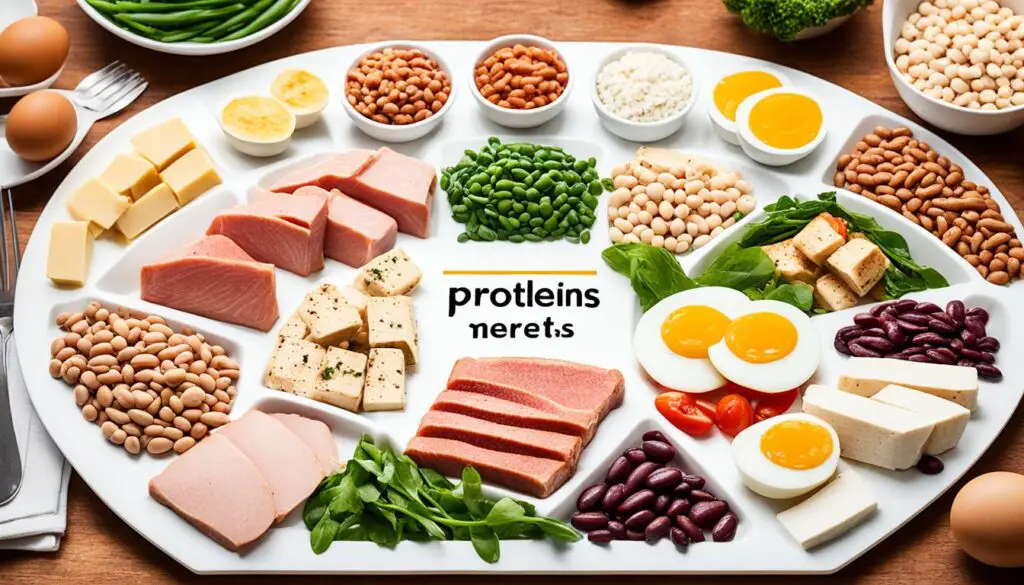
Planning meals ahead of time is essential for creating a balanced and protein-rich eating plan after completing the HCG diet. By taking the time to prepare meals in advance, you can save time and avoid making impulsive food choices that may hinder your weight loss goals. Here are some meal planning tips to help you navigate your post-diet journey:
1. Incorporate Protein-Rich Recipes
Emphasizing protein in your meals is crucial for supporting weight loss and maintaining muscle mass. Look for recipes that incorporate lean sources of protein such as chicken, fish, tofu, and legumes. These protein-rich recipes will not only keep you feeling fuller for longer but also ensure you meet your daily protein requirements.
2. Explore Different Meal Ideas
Don’t be afraid to get creative and try new meal ideas. Experiment with different flavors and ingredients to add variety to your post-diet eating plan. Incorporate a variety of vegetables, whole grains, and healthy fats to create well-rounded and nutritious meals that are satisfying and delicious.
“Planning meals ahead of time can save you from making impulsive food choices and help you stay on track with your weight loss goals.”
3. Opt for Balanced Meals
When planning your meals, strive for balance. Aim to include a combination of protein, vegetables, and healthy fats in each meal. This ensures that you’re getting a good mix of nutrients and helps keep your meals satisfying and flavorful.
4. Use Portion Control
Monitoring portion sizes is crucial for maintaining weight loss. Even if you’re consuming healthy foods, overeating can easily lead to weight regain. Use measuring cups or a food scale to accurately portion your meals and snacks. By practicing portion control, you can ensure that you’re consuming the right amount of calories to support your weight maintenance goals.
5. Create a Weekly Meal Plan
Having a meal plan for the week can provide structure and help you stay on track with your post-HCG eating plan. Sit down at the beginning of each week and plan out your meals and snacks. This allows you to make sure you have all the necessary ingredients on hand and prevents last-minute decisions that may derail your progress.
6. Prepare Meals in Batches
Saving time is a key benefit of meal planning. Consider preparing your meals in batches, especially for busy days. Cook larger portions and divide them into individual meal-sized containers. This way, you have pre-prepared meals ready to go when you’re short on time. It also helps resist the temptation of grabbing unhealthy convenience foods when hunger strikes.
7. Pack Healthy Snacks
Don’t forget to plan for snacks. When hunger hits between meals, having healthy snacks on hand can help you avoid making unhealthy choices. Pack protein-rich snacks such as Greek yogurt, hard-boiled eggs, or protein bars to keep you satiated and energized throughout the day.
By following these meal planning tips, you can ensure that your post-HCG eating plan is not only protein-rich but also varied, balanced, and sustainable. Remember to consult with a healthcare professional or registered dietitian for personalized advice and support tailored to your specific needs.
Monitoring Caloric Intake
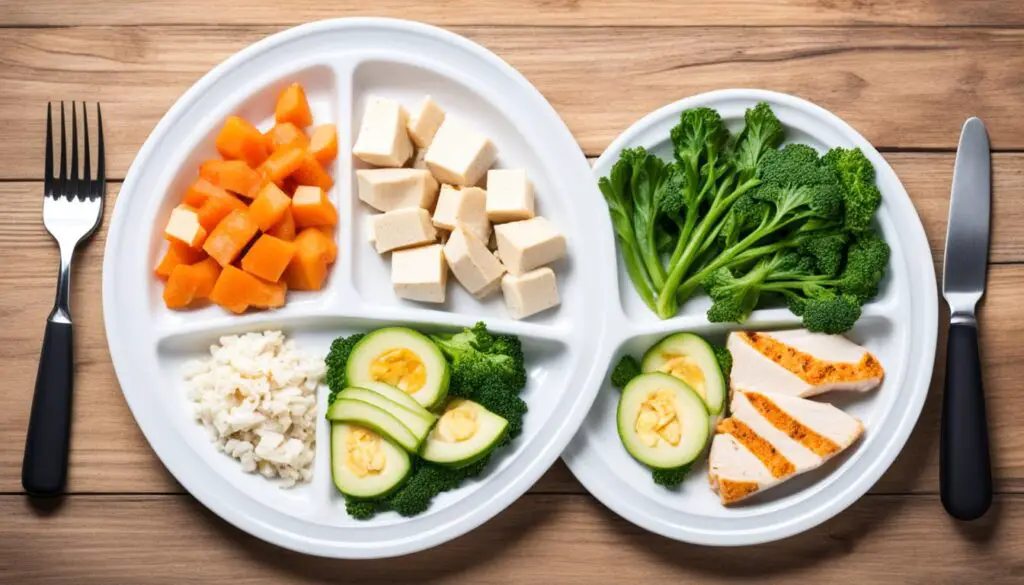
After completing the HCG diet, it’s crucial to maintain a careful watch over your caloric intake to sustain your hard-earned weight loss results. While the HCG diet imposes extreme calorie restriction, it’s essential to strike a sustainable balance and avoid overeating. By tracking calories and practicing portion control, you can ensure that your caloric intake remains aligned with your weight maintenance goals.
Tracking calories allows you to have a clear understanding of the amount of energy you consume each day. This awareness is vital for maintaining a healthy weight and preventing unintentional weight gain. Whether you opt for a manual diary or utilize a mobile app, tracking your calories empowers you to make informed decisions about your food choices.
Practicing portion control is another crucial aspect of monitoring caloric intake. It involves keeping a conscious eye on the quantity of food you consume during mealtimes. By portioning your meals appropriately, you prevent the temptation to overindulge, allowing for a more controlled and balanced diet.
Here are a few strategies that can help with monitoring caloric intake:
- Use a kitchen scale to measure your food accurately.
- Read nutrition labels and understand serving sizes.
- Opt for smaller plates and bowls to create the illusion of a fuller plate.
- Listen to your body’s hunger and fullness cues to prevent overeating.
- Plan your meals and snacks in advance to avoid impulsive choices.
Remember, maintaining weight loss is a lifelong journey that requires consistency and mindful decision-making. By monitoring your caloric intake through tracking calories and practicing portion control, you can enjoy a sustainable and healthy lifestyle post-HCG diet.
Consulting a Healthcare Professional

Before embarking on any diet plan, including a post-HCG eating plan, it is imperative to consult with a healthcare provider or a registered dietitian. This step becomes even more crucial if you have underlying health conditions that need to be considered.
A healthcare provider or registered dietitian possesses the expertise and knowledge to provide personalized guidance and support in creating a post-diet eating plan that aligns with your individual needs and goals. They can assess your overall health, evaluate any specific dietary requirements, and design a nutrition plan tailored to your unique circumstances.
Furthermore, a healthcare professional can offer comprehensive post-diet guidance to ensure a smooth transition from the HCG diet to a sustainable and balanced eating routine. They can help you navigate potential challenges, address nutritional gaps, and provide strategies for long-term weight management and overall well-being.
Consulting a healthcare professional is crucial for receiving evidence-based advice and ensuring your post-diet journey is safe, effective, and sustainable.
Remember, every individual’s health needs and goals are different. Seeking guidance from a healthcare professional is the most prudent way to make informed decisions about your post-diet plan and achieve optimal results while prioritizing your well-being.
By collaborating with a healthcare provider or registered dietitian, you can embark on the next phase of your health journey with confidence, armed with expert guidance and support.
Conclusion
In conclusion, while the HCG diet may offer rapid weight loss results, it’s essential to consider the lack of scientific evidence supporting its efficacy and safety. Instead, I recommend focusing on a balanced and protein-rich post-HCG eating plan to support weight maintenance and overall health.
Incorporating lean protein sources such as chicken, fish, turkey, and lean beef can help maintain muscle mass, promote satiety, and assist in weight management. It’s also important to monitor caloric intake and practice portion control to sustain weight loss results.
Furthermore, consulting a healthcare professional, such as a registered dietitian, can provide personalized guidance and support in creating a post-diet eating plan that aligns with your specific needs and goals.
Remember, there are many other weight loss options available that are much safer and supported by scientific research. Prioritizing a protein-rich diet, monitoring caloric intake, and seeking professional guidance are key steps in maintaining weight loss results and promoting optimal nutrition.
FAQ
What is the HCG diet?
The HCG diet is a weight loss plan that combines HCG supplements or hormone injections with a severely reduced calorie intake.
Is the HCG diet safe and effective?
The HCG diet is highly controversial and not recognized as safe or effective by health experts.
Why is protein important for weight loss?
Protein promotes satiety, increases metabolism, and supports weight management.
What are some high protein foods for post-HCG eating?
Examples of high protein foods include chicken, fish, turkey, lean beef, eggs, Greek yogurt, cottage cheese, tofu, and legumes.
Which lean protein sources can I incorporate into my diet after the HCG plan?
Lean protein sources that can be included in post-HCG meals are chicken breast, white fish, turkey breast, and extra-lean beef.
Are there protein sources for individuals following a vegetarian or plant-based diet?
Yes, plant-based protein sources such as lentils, quinoa, chickpeas, and tofu can be incorporated into meals for individuals following a vegetarian or plant-based diet.
Why is protein important for muscle maintenance?
Consuming adequate protein can help preserve muscle mass and support a healthy body composition during weight loss.
How can I balance protein with vegetables and healthy fats?
Combining protein with vegetables and healthy fats creates balanced meals that provide various nutrients. Examples of healthy fats include avocado and olive oil.
What are some meal planning tips for post-HCG eating?
Planning meals ahead of time, preparing meals in advance, and exploring protein-rich recipes can help create a successful post-diet meal plan.
How can I monitor my caloric intake after completing the HCG diet?
It’s important to track calories and practice portion control to ensure that caloric intake aligns with weight maintenance goals.
Should I consult a healthcare professional before starting a post-HCG eating plan?
Yes, it’s crucial to consult with a healthcare professional or registered dietitian to create a personalized post-diet eating plan that aligns with individual needs and goals.
Is the HCG diet a recommended weight loss option?
The HCG diet is not recommended due to lack of scientific evidence supporting its efficacy and safety. There are safer weight loss options supported by scientific research.

